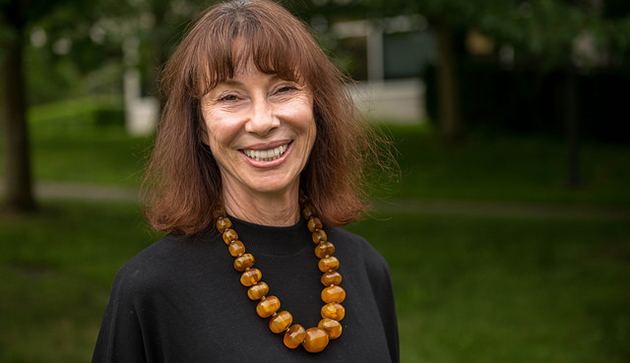On Wednesday, March 21, UFV English Professor Miriam Nichols hosted a public lecture on the shifting societal role of poetry, tracing its function from antiquity through to the modern day.
Nichols’ talk, titled “Poetry Now: Memory, Measure, and Meaning for the 21st Century” focused on what Nichols termed “Big Poetry” — the kind of poetry that communicates “big” cultural values.
Although faculty and staff made up the bulk of attendees, students, alumni, and community members could be spotted sitting among the crowd gathered in A225 to hear Nichols speak.
A mainstay of UFV’s English department whose scholarly endeavours were most recently formally recognized by the university in 2017 when it awarded her that year’s Research Excellence award, Nichols began the evening by drawing a distinction between what she termed “poesis” and Big Poetry.
“Poesis is not just metered verse,” said Nichols, “but rather verse making arguments.”
The distinction, according to Nichols, boils down to poetry which, as it comes out of a specific cultural, historical, and geographical background, espouses a distinct philosophy, and set of values.
Big Poetry, argued Nichols, is how knowledge is passed down. It lays down guidelines for living.
“[Big Poetry] shows us how to act,” said Nichols. “These are narratives which hold the world-view and/or identity of a given people. They chronicle the identity of people by communicating how to act.”
Nichols named epic poems like Homer’s Iliad and Odyssey, and the Indigenous Sky Woman creation myth as examples of Big Poetry.
“The differences between Homer’s Odyssey and Sky Woman,” said Nichols, “illustrate the difference between [philosophies of] dominance over nature and co-existence.”
Big Poetry, argues Nichols, fails in the 21st century for several reasons. Among these are the emergence of a sustained critique of single ideological reference points, or the espousal of “master narratives” (that is, narratives which claim to communicate “the truth”). As the century turns, and a focus on tribalism/ethnocentrism fades, we begin to lose our belief in or espousal of narratives specifically linked to countries of origin, or cultural roots.
From this point onwards, poetry is individual.
“The humanities instead focus on addressing the differences between individuals and fragment populations,” Nichols points out. “We lose cultural memory, and lose the ability to relate to others because social identity is so fragmented in society.”
As Nichols points out, Big Poetry takes a back seat to individual narratives throughout the 21st century. We can’t revert to the practice of specific cultural narratives after having focused on individual narratives for the greater part of the 20th century. Consequently, Nichols proposes the emergence of a mode that she calls “the view from here.”
“Since the scholar-poet doesn’t inherit a world-view,” she says, “they must go into the cultural archive and adopt one. They must know the traditions of where they are, and apply them to the here and now.”
Nichols points out, however, that to avoid chauvinism, the contemporary poet needs to be educated on the problems they attempt to address.
“The scholar-poet has to mold tradition to their goals.”
Envisioning the emergence of Big Poetry once more, Nichols acknowledges the need for poetry which moves away from immediate observation, and embraces bigger issues which apply to whole communities or people.
“The secular poet dives into the canon, and uses the things he finds there to relate to the specific canon they have chosen to take part in,” says Nichols. “What matters isn’t the depth of the dive, or the breadth of the poet’s vision, but what they manage to do with the bits and pieces they choose.”
The poet of today can’t help but be political, argues Nichols.
“Big Poetry tries to go beyond simply stating ‘this is what I think or feel’,” says Nichols, “and attempts to deal with the big problems that we have to contend with as a people.”
It falls to the contemporary poet to tap once more into an overarching narrative of Big Poetry.
“The poet/artist makes the real world visible. They shine a light on delegitimized people,” she argues. “This way perhaps, instead of policy measures that might overlook real people, the politicians or citizens can access the realities of their countrymen.”
Image: UFV

